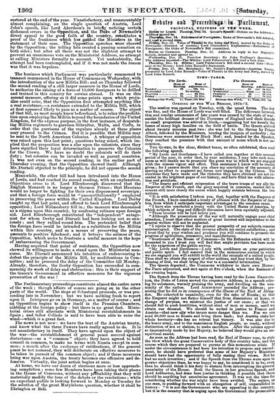The business which Parliament was particularly summoned to transact commenced
in the House of Commons on Wednesday, with the introduction of the new Militia Bill; and on Thursday followed the second reading of a still larger measure in the House of Lords, to authorize the raising of a force of 15,000 foreigners to be drilled and trained in this country for service abroad. It was on this second measure, offering as it did some points upon which preju- dice could seize, that the Opposition first attempted anything like a real resistance,—a resistance extended to the Militia Bill, which at first appeared likely to pass as a matter of course. The object of that bill, as most people knew beforehand, is to relax the prohibi- tion upon employing the Militia beyond the boundaries of the United Kingdom, for the express purpose, in the first instance, of despatch- ing Militia regiments to garrison Gibraltar, Malta, and Corfu, in order that the garrisons of the regulars already at those places may proceed to the Crimea. But it is possible that Militia may be sent to the North American Colonies. A whisper of opposition was raised upon this last point ; questions being asked, which im- plied that the proposition was a slur upon the colonists, since they have signified their loyal determination to preserve the Colonies for the Crown. We have no doubt the colonists will do their duty ; but colonies can be invaded as well as parent countries. It was not even on the second reading, in the earlier part of Thursday evening, that the Opposition showed itself. Although Mr. Disraeli objected to the principle, he did not oppose the second reading. Meanwhile, the other bill had been introduced into the House of Lords, and had reached its second reading, with an explanation. Objections arose to it. Lord Ellenborongh discovered that the English Monarch is no longer a German Prince ; that Hessians would no longer be fighting for their own dispossessed sovereign; and that a foreign force would be " unconstitutionally " employed in preserving the peace within the United Kingdom. Lord Derby caught up that last point, and offered to back Lord Ellenborough 's opposition ; Lord Malmesbury fell in ; the measure was denounced as a stigma upon this country, by confessing reliance upon foreign aid. Lord Ellenborough constituted the " independent' antago- nist for whom Derby and Disraeli had been looking out so anx- iously ; and they rallied round him. The pretended belief that the foreign force could be intended as a substitute for the Militia within this country, and as a means of preserving the peace, amounts to positive falsehood ; and it betrays the animus of the Opposition, which seeks to frustrate a useful measure in the hope of embarrassing the Government.
Having acquired that point of resistance, the Opposition now showed its willingness to make a stand upon the Ministerial mea- sures. Mr. Disraeli announced his intention of endeavouring to defeat the principle of the Militia Bill, by modifications in Com- mittee; and he procured the delay of the Committee till Monday. Already, therefore, the Derby Opposition has succeeded in com- mencing its work of delay and obstruction : this is their support of the Queen's Government in effective measures for the vigorous prosecution of the war




































 Previous page
Previous page